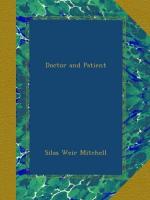You selfishly enjoy his visit, not suspecting that you, too, are ignorantly helpful. He has been in sadder homes to-day, has been sorely tried, has had to tell grim truths, is tired, mind and body. The visit he makes you is for him a pleasant oasis: not all convalescents are agreeable. He goes away refreshed.
Most doctors have their share, and more, of illness, and are not, as I have seen stated, exempt from falling a prey to contagious maladies. Indeed, our records sadly show that this is not the case. Perhaps there is value for them and their future patients in the fact that they have been in turn patient and doctor and have served in both camps. Like other sick folks, the physician, as I know, looks forward, when ill, to the “morning visits” quite as anxiously as do any of those who have at times awaited his own coming.
That medical poet who has the joyous art of sending a ripple of mirth across the faces of the Anglo-Saxon world recognizes this fact in a cheerful poem, called “The Morning Visit,” and to which I gladly refer any of my readers who would like to know from the lips of Oliver Wendell Holmes what manner of delightful patient he must have been. I can fancy that he lost for his doctor many a pleasant hour.
It has seemed to me as if this wonderful remaking and regrowing of the tissues might be likened to a swift change from the weak childhood of disease to a sudden manhood of mind and body, in which is something of mysterious development elsewhere unmatched in life. Death has been minutely busy with your tissues, and millions of dead molecules are being restored in such better condition that not only are you become new in the best sense,—renewed, as we say,—but have gotten power to grow again, and, after your terrible typhoid or yellow fever, may win a half-inch or so in the next six months,—a doubtful advantage for some of us, but a curious and sure sign of great integral change.
The Greeks had a notion that once in seven years we are totally changed, the man of seven years back having in this time undergone an entire reconstruction. We know now that life is a constant death and a renewing,—that our every-day nutrition involves millions of molecular deaths and as many millions of births,—although to liken that which is so exquisitely managed, so undisturbingly done, to the coarser phenomena of death and birth is in a measure misleading.
Diseases such as typhoid fever, or a sharp local lung-trouble like pneumonia, really do make these minute changes approximate in abruptness to death. You weigh, let us say, one hundred and eighty pounds, and you drop in three weeks of a fever to one hundred and thirty pounds. The rest of you is dead. You have lost, as men say, fifty pounds, but your debt to disease, or to the blunders of civilization, for it is a case of creditor behind creditor, is paid. Your capital is much diminished, but you have come out of the trial with an amazing renovation of energy. This is the happy convalescence of the wholesome man. The other, the unlucky, fellow, does not get as safely through the cleansing bankruptcy of disease. The vicious, unlucky, or gouty grandfather appears on the books of that court in mysterious ways; his sins are pathologically visited on his child’s child in this time of testing strain.




